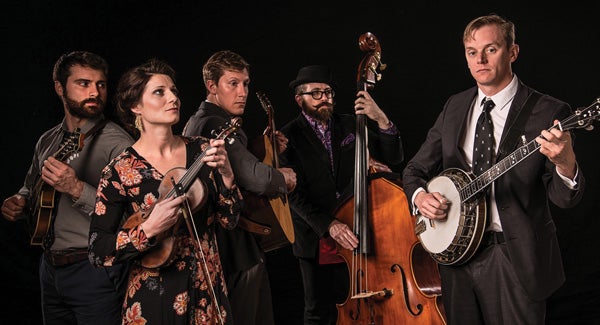High-Class Bluegrass
Hank, Pattie & the Current put a twist on bluegrass tradition
If you’ve checked out the local bluegrass scene at all, chances are you’ve run across Hank Smith and Pattie Hopkins Kinlaw ’06.
With their band, The Current, the banjo-fiddle duo plays traditional bluegrass with a twist or two. Often, they bring in a classical flavor, stemming from Kinlaw’s formal violin training. And they’re equally at ease playing pop songs.
News & Observer correspondent Stacy Chandler caught up with the band last fall in Raleigh at a “Beer & Banjos” show – a weekly showcase hosted by Smith at Raleigh Times featuring local roots-music artists. Her article is edited here; the complete version is available at newsobserver.com.

Robert Thornhill, Kinlaw, Ben Parker, E. Scott Warren and Smith play as The Current.
Smith and Kinlaw previously played together in the bluegrass band Kickin Grass as well as the rock band The Morning After. When both groups reached the end of their roads, Smith recalled, “We just sort of looked at each other and were like, ‘Well, now what do you want to do?’”
Bluegrass was the answer. To fill out the sound, they brought in three other musicians who knew the roots but liked to branch out: Ben Parker on guitar, Robert Thornhill on mandolin and E. Scott Warren on bass. Hank, Pattie & The Current’s onstage debut came at 2014’s World of Bluegrass, and two years later they released their self-titled debut album. Critics lauded it, and the single “Sundown” was on the ballot to be considered for Grammy nomination.
Last summer brought their second album, Hold Your Head Up High (Robust Records), with 12 original tunes showcasing the band’s vocal and instrumental skills as well as various musical influences. The band will release its third album this summer, a live recording of its show Sept. 22 at the Fletcher Opera Theater in Raleigh.
As a girl, Kinlaw had music in her blood and started playing violin at age 4. Her mother, Charley Ann Hopkins ’79, is a classical and church organist, and her great-grandfather had a bluegrass radio show in Bertie County in the 1950s. Kinlaw grew up playing classical, but she also had a love for roots music and a dream to move to Nashville to be a fiddle player.
Her parents, however, insisted on college (She says now, “Which I am very thankful for at this time.”), so she headed to ECU and studied violin performance and pedagogy, which has allowed her to connect classical and American roots music as a performer and a teacher.
For Kinlaw, who lives in Winterville and teaches in Greenville and Williamston, working with young musicians is a chance to pass along tradition as well as technique. They’ve also started the American Music Foundation of North Carolina, aimed at increasing education about American music in the state.
“As Americans, I personally believe that we should learn our music, these great American genres,” she said. “So I teach my kids how to play a 12-bar blues, they learn how to play a Bach minuet, and they learn how to play jazz and blues and bluegrass and things like that.”
Kinlaw and Smith have performed all around the country, but they see North Carolina as a bright spot for roots music.
“In the state in general … we’re so diverse in our culture and our history and music as a state,” she said.
